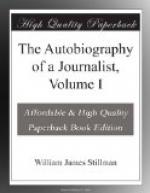I made a visit of ten days to Paris and saw with great profit the work of the landscape painters and of Delacroix, the other figure painters in general not interesting me much. I carried a letter of introduction from the Wehnerts to Mademoiselle Didot, the daughter of Firmin Didot, the famous publisher, then an old blind man, but one of the most interesting Frenchmen I ever knew, as Mademoiselle Didot was the most brilliant Frenchwoman. The old man was much interested in what I had to say of America, and he paid us the national compliment of saying that we spoke English more intelligibly than Englishmen in general. As I spoke no French, our conversation was in English, and he understood me perfectly, though he said he rarely could follow without difficulty the conversation of an Englishman, while Americans in general he understood readily. To accomplish all that I did with my fifty pounds it may be easily understood that I had to cut my corners close, and in fact they were so closely cut in my Continental excursion that I landed at Newhaven on my return with one shilling in my pocket, and when, at the end of my stay in England, I took the train for Liverpool, I had only sixpence (my passage being provided for), and my good friend Delf, who saw me off, on finding the state of my purse, insisted at the railway station on my taking a sovereign for contingencies.
This habit of making no provision for accidents had been a part of my moral training, the faith in the overruling Providence never forsaking me for an instant, so that, whatever I set about to do, I made no provision for accidents. To go ahead and do what I thought I ought to do, and let the consequences take care of themselves, has been the habit of mind in which I have always worked and probably still work. If the thing to be done was right, I never thought of what might come after, or even whether I had the means to carry a resolution into effect, taking it for granted that the means would be provided because the thing was to be done. I retain the distinct recollection of an expression of my mother while I was making preparations for this first voyage to Europe, and she was packing my clothes for the voyage and her lips were silently moving and the slow tears running down her cheeks. She said in her low and murmuring voice as if in comment on her prayer, “Oh! no, he is too pure-hearted,” and I knew that the prayer was for my protection from the temptations of that world of which she only knew the terrors and dangers from her Bible, and that she was so wrapt in her spiritual yearnings that she had quite forgotten my presence. Poor mother! I never deserved the great trust she had in me, but the memory of that moment has served me in many devious moments to keep me in the path. But if I had no such virtues as those which she attributed to me, I had what was perhaps more potent, the intuitions which I inherited from her, and such as often take a man out of temptation before he is aware of its strength, and before it becomes a real danger; nor can any man remember such confidence on the part of his mother without, from very shame, if no sterner motive should exist, maintaining a higher tone of life.




